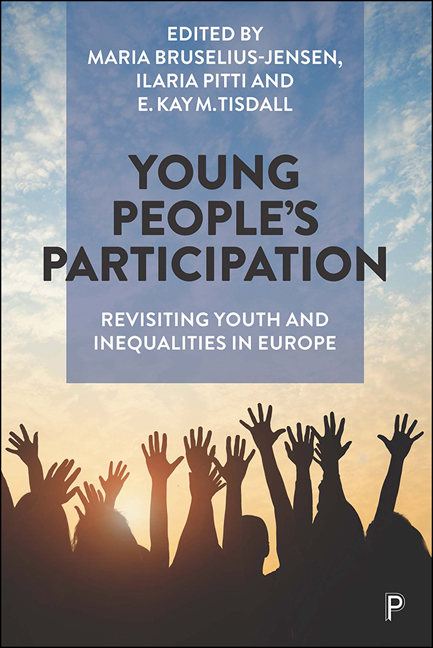Book contents
- Frontmatter
- Contents
- List of figures and tables
- Notes on contributors
- Acknowledgements
- 1 Revisiting young people's participation: an introduction
- PART I Young people's experiences of participation and engagement
- PART II Current state and conditions for young people’s participation: critiques and trends
- PART III Broadening participation: young people's own approaches to participation
- PART IV New opportunities for young people's participation: facilitating new forms of youth participation
- Index
7 - Digital participation and digital divides in a former socialist country
Published online by Cambridge University Press: 18 December 2021
- Frontmatter
- Contents
- List of figures and tables
- Notes on contributors
- Acknowledgements
- 1 Revisiting young people's participation: an introduction
- PART I Young people's experiences of participation and engagement
- PART II Current state and conditions for young people’s participation: critiques and trends
- PART III Broadening participation: young people's own approaches to participation
- PART IV New opportunities for young people's participation: facilitating new forms of youth participation
- Index
Summary
This chapter discusses the issue of youth digital participation. Social media in particular is thought to be able to open up new means of being political, albeit with strong criticism of participation via this means also noted. The chapter focuses on this theme of digital participation in Estonia, a country labelled as the ‘first digital nation’ that also has the legacy of being a former socialist country with limited levels of civic engagement and variable levels of participation between different groups of young people. The chapter hence analyses how young people politically engage through the internet, and how differences persist between those who use the internet for politics and those who do not. Empirical evidence is taken from a large-scale European project, MYPLACE (Memory, Youth, Political Legacy and Civic Engagement), which gathered data from two contrasting sites within Estonia, thus enabling contrasts to be made between different youth digital participation experiences.
Key findings
• Participation via social media can have democratic value because young people tend to use the internet to engage in politics.
• Social media opportunities are especially important in countries without a history of strong civic engagement as they allow young people to get involved in a less public and more individualised manner.
• Internet access and the availability of services offering easy access to engagement with political issues means differential access to these opportunities.
• The gap between those who use the internet for politics and those who do not may persist regardless of equal access and skills.
Introduction
Young people's limited trust in political systems has been frequently noted and discussed, particularly the assumption that this leads to a lack of political participation. However, there is growing evidence to support the idea that in the digital age, conventional participation is being replaced by new, more individualised forms of political awareness that may provide a youth-centric means of participating. Young people, it has been argued, are more likely to devote time to social activities outwith traditional political institutions, with the meaning of participation undergoing profound change (Stolle and Hooghe, 2011). A variety of concepts have been introduced to encapsulate these changes; for example, Bakardjieva's subactivism (2009) and Amna and Ekman's (2013) standby citizen.
- Type
- Chapter
- Information
- Young People's ParticipationRevisiting Youth and Inequalities in Europe, pp. 99 - 118Publisher: Bristol University PressPrint publication year: 2021

